|
Tomorrow, we celebrate the birthday of St. Vincent Pallotti, patron of the Catholic Apostolate Center and founder of the Union of Catholic Apostolate. St. Vincent Pallotti was born on April 21, 1795. How appropriate for the saint who lived and worked in the city of Rome to share his birthday with the traditional date for the founding of the city. To help celebrate his birthday, I have put together a list of some of his more interesting achievements and activities during his life. I hope that you too will be inspired by his life. 1) The Baptism of St. Vincent Pallotti St. Vincent Pallotti was baptized on April 22, 1795 in the St. Lawrence Church in Rome. This began his life in the church. 2) St. Vincent Pallotti on Holiday On his arrival in Frascati around 1805, St. Vincent Pallotti exchanged his new shoes for that of a poor boy. Giving away his new clothing to the poor would become a lifelong habit for the saint. 3) St. Vincent Pallotti Makes a Prediction While speaking with the young Giovanni Mastai-Ferretti in 1817, St. Vincent Pallotti predicted that he would one day be elected to the papacy. Mastai-Ferretti was elected Bishop of Rome on June 16, 1846. 4) St. Vincent Pallotti the Professor St. Vincent Pallotti was awarded two doctoral degrees in both theology and philosophy in 1814 and 1819. Teaching was one of the favorite activities of the saint. 5) St. Vincent Pallotti Showing Courage During the cholera epidemic of 1837, St. Vincent Pallotti organized a barefoot procession of religious. This action was penitential and showed that they were not afraid of the disease. 6) Catholic Apostolate Received Church Approval St. Vincent Pallotti received approval for the Catholic Apostolate from the Church in 1835. Pallotti also received support for the Catholic Apostolate from Pope Gregory XVI when others objected to it. 7) St. Vincent Pallotti the Chaplain Beginning in 1838, St. Vincent Pallotti served as a prison chaplain in Rome. He often worked with the condemned, saving many souls. He had a true willingness to serve all, especially the poor and the marginalized. 8) St. Vincent Pallotti the Peacekeeper St. Vincent Pallotti stopped a riot in the Trastevere neighborhood of Rome. He implored the people to stop rioting by showing them an image of Mary, Mother of Divine Love. 9) St. Vincent Pallotti Preaches one Last Time On the last day of the octave of the Epiphany in 1850, St. Vincent Pallotti gave his final sermon. 10) St. Vincent Pallotti Dies In 1850, St. Vincent Pallotti gave his final blessing to his followers. He showed great courage even in the face of death. There are many more stories about St. Vincent Pallotti that you may find interesting. Check out our St. Vincent Pallotti Portal to learn more about our patron and his many works.
0 Comments
In high school we had a religion teacher, named Mr. Matthews, who used to tell us not to worry about memorizing anything from his class but these words: “Love God with your whole mind, heart, soul and strength. Love your neighbor as yourself.” He would say, “If you come back and see me twenty years from now, I’ll be happy if those words are all you remember.” Mr. Matthew’s motto was inspired of course by Matthew 22:34-40, which happens to be today’s Gospel reading for the [Optional] Memorial of Saint Louis of France. In this text, Jesus clarifies that love of God and love of neighbor are the two greatest commandments on which everything else depends. To put in another way – without love, we are nothing (1 Corinthians). The pandemic has shown just how much we need this love in our world. And while it may be challenging to connect with one another right now, there are still ways we can share love with others from wherever we happen to be. Three Small Ways of Loving God
Three Small Ways of Loving Neighbor
Remember also, we are called to “love your neighbor as yourself.” During this unique and challenging time, are you taking care of your own spiritual, emotional, and physical needs? If you aren’t sure, it may be worth spending some time today writing down a short list of ways you can practice healthy self-care. If you liked this article, be sure to check out “Living the Corporal and Spiritual Works of Mercy During COVID-19” and “Mental Health and Coronavirus.” When I was a senior in high school in the diocese of Joliet, then-Bishop Peter Sartain came to celebrate one of our monthly school Masses. I was asked to assist the Bishop for the day, and throughout the day he and I had many warm conversations. I received a piece of mail a few weeks later from Bishop (now Archbishop) Sartain containing a handwritten note and several prayer cards with Blessed Pier Giorgio Frassati’s image on them. Little did I know that the young Blessed would soon become one of my dear patron saints. In my opinion, anyone who offers their life as an apostle on mission—including lay and ordained ministers, Catholic school employees, catechists, and all spiritual guides—should keep Blessed Pier Giorgio Frassati as their patron saint and their example to combat despair and to joyfully share the Gospel. Blessed Pier Giorgio shows us the Christ-like demeanor and personality that the Church and her ministers and missionaries should possess as they evangelize the world. Blessed Pier Giorgio makes an excellent spiritual guide and mentor because he was an ordinary young man with a profound commitment to the poor and to justice. There are countless books and articles that describe how Pier Giorgio spent hours serving the poor and the homeless, often giving away the money he had for bus fare and even his own jacket! His parents misunderstood his great actions of charity, and often scolded him when he returned home late without his coat. He was never distracted from the missionary imperative of the Gospel. Instead, he served those on the margins as Jesus commanded. Archbishop Wilton Gregory of Washington D.C. recently stated in a webinar, “The Church lives in society. The Church does not live behind the four [walls] of the structures where we worship.” Just as Pier Giorgio Frassati befriended the poor and sought justice as a “man of the beatitudes,” we too must go beyond the four walls of our churches, homes, and offices into the margins of our society to serve our brothers and sisters and work for justice. Blessed Pier Giorgio also accompanied others in their pursuit of God. He maintained unlikely friendships and was neither bound up by cynicism nor weighed down by scandal. Instead, he actively worked against these in his interactions with all. Many stories detail his love for pranks, making bets with his friends over games and making the stakes be attending Mass or Adoration. Like this soon-to-be-saint, we must live in the world while encouraging others to return to Christ in the spirit of friendship. As apostles on mission, we must live, work, and play with a renewed spiritual vision, driven by the practice of spiritual accompaniment. The quality I most admire in Blessed Pier Giorgio is his ultimate trust in God’s plans. He did not try to take control of his life’s plan nor did he envy God’s authority. Rather, he allowed God to guide him as he discerned his future and his mission in life. Pier Giorgio brought Church doctrine to life through his service and actions. He lived with a gospel-inspired freedom. He spent time in deep prayer, contemplating the mission God had laid before him, discerning to serve the poor as a lay man with expertise in mechanical engineering rather than as a priest. Pier Giorgio trusted God. As Alfonso Nebreda, S.J. wrote, “We must not forget that man cannot nourish his spirituality with orthodoxy alone … there is more to Christianity than this … for faith is life” (Kerygma in Crisis?, Nebreda). Blessed Pier Giorgio embodied the Gospel, and he lived it out according to his mission from God. As we consider the life of Blessed Pier Giorgio Frassati, I invite those who serve the Church as lay or ordained ministers, catechists, educators, and spiritual guides to adopt this young saint as a guide for our spiritual lives and our ecclesial missions. Let us invite the same Spirit who lived in Blessed Pier Giorgio and who makes the Church vibrant to renew our hearts, minds, and missionary efforts. Blessed Pier Giorgio, pray for us! Interested in learning more about becoming an apostle on mission? Click here to learn more. Many of us are acutely aware of how the coronavirus pandemic has imposed restrictions on our daily life. Social distancing (or “self-imposed monasticism”, as Bishop Barron puts it) for weeks has drastically changed our routines but reduces the risk of infecting others. While we cannot worship, shop, entertain, work, or relax as usual, we can adapt how we carry out these activities in isolation and facilitate opportunities to foster connections with peace of mind. As a Knight of Columbus, it was at first a challenge for me to grasp how a global Catholic service order—built upon fraternity among members as a core principle—could carry out its charitable works in isolation. The needs of the community my local council usually served were not going to decrease as this crisis continued, so we found ourselves reviewing the resources at our disposal in order to comply with the federal and state guidelines of social distancing. Since we could not meet as a council to plan our actions, communicating online became the norm. My brother Knights were able to approve plans to shop for the needs of those at-risk populations, collect food and supplies for local distribution, and donate funds to the parishes we served. We reached out to healthcare workers and those who are alone to address their needs and lend a listening ear. As Knights, we’re simply caring for our communities; our Faith rallies us to action to serve in the likeness of our Founder, Venerable Fr. Michael J. McGivney and, of course, our Lord. There are challenges ahead, but we rise to the occasion through prayer, hope, and love. The doors may be closed, but make no mistake: the Church is alive! Christians and really anyone who seeks the common good are given this same opportunity to review their position in life and see if they can offer any support among their neighbors. Young families are dealing with schools and recreational areas being restricted; some neighborhoods are decorating themselves with various engaging themes, such as Christmas light exhibitions or placing teddy bears in windows, that families can drive through. In addition, those of advanced age or among vulnerable populations may not feel safe leaving their homes during the pandemic; loved ones are sending letters, making phone calls, or even stopping outside of windows and doors to share smiles and wave safely across the glass. As we restrict our time outside of our homes, we nevertheless find inspiration in the selfless actions of those continuing to minister to the physical, mental, and spiritual needs of others. Doctors, nurses, cleaning crews, food workers, priests, religious, and many others on the front lines of this crisis are faithfully doing their duties wherever they are called. The rest of us do our part by restricting unnecessary activities and offering our love to anyone in need. We may have personal doubts and worry for our loved ones, and that’s okay. We have not lived through anything like this before, but we know the Risen Lord has conquered death forever. He was with the disciples even when they doubted His Resurrection; He is with us now… and through the hour of our death. The Easter season continues. While most of the Masses we are participating in are livestreams and our usual Communion with the Lord is currently a spiritual act, we continue to proclaim “Alleluia!” Our hope has not diminished. We have no reason to fear! The victory has been won. The best is yet to come. He is risen from the dead. Glory to God forever and ever. Praised be Jesus Christ, now and always! Amen. http://www.usccb.org/bible/readings/040520.cfm
When you hear “Lent,” or “Stations of the Cross,” what comes to mind? Is this just an annual season before the Easter festivities, or a must-follow ritual the Church demands of you? Or, is this a period you can truly focus and reflect on the mystery of God’s love for mankind – and the mystery of one man’s sacrifice and passion for all (including those He was yet to meet, like you and I)? Some years ago, during a discussion among friends, one person asked, “what’s the point of going through Lent and the Stations of the Cross all over again when Jesus did that already?” and the response was, “if we put ourselves through the Stations of the Cross meaningfully, we are able (even just for a few days) to put our feet in Christ’s sandals so that we would also learn to love (even to death) all mankind; regardless of how often we are hurt in the process.” The Passion of Christ demonstrates how much we are loved and how far God will go to show love to us. Sometimes, I think Jesus may have wanted to change His mind while praying in Gethsemane, where he sought God in the midst of sorrow and distress. Sometimes, we also feel sorrow, anguish, and distress. If given the power, we would ‘run out’ of our lives. How often have we come to that point of not wanting to go any further? How often have we thought, “I’m not sure I can do this”? I know I have. Jesus turned to God for comfort and reassurance. Who do you turn to during the tough times? Focus on Spirituality: When everyone Jesus knew had either ‘sold Him off,’ denied Him, or run away for their own safety, it must have felt as though He had been abandoned by those he had thought loved Him so dearly. Even today, there are people all around us who feel abandoned and do not know where or who to turn to. Today, as we ask Jesus where He would like to celebrate Passover, His response is: “I would like to celebrate Passover in your heart.” Have you prepared your heart for the Passover feast? If we also ask Jesus, “who would you like to celebrate it with?” I am sure His response is: “the lonely, the broken, the anxious, the weary, the frightened, and the sick and with you.” As we prepare our own hearts for the Passover feast, let us extend Jesus’ invitation to those in need on His behalf. PRAYER LORD, thank You for choosing my heart to celebrate the Passover; teach me to prepare my heart so that You would have the best Passover feast. As I send out Your invitations, help me look out for the hearts that need You- help me look beyond the cover-up smiles; and as I give out these invitations of hugs, laughter, smiles, joy and comfort, may I remember to take my seat at the table to feast with You. Amen! Service Suggestion: Journey with Jesus through the Stations of the Cross - may it not be out of a sense of obligation but because You know that Jesus needs a friend who will walk with Him through His rise and falls on this journey. Do not look too far, there may be someone closest to you who needs a friend or a listening ear for a short journey. As you take this journey, allow Jesus to prepare your heart not just for the Passover but for all His celebrations and may the way you speak and live give you away (like Peter’s speech betrayed him). To learn more about faith-based service opportunities, please click here. Benita Amoako is a St. Joseph Worker Program NY Alumnae. Can you believe we are already in the fifth week of Lent? Personally, this year’s Lenten season has flown by for me. While I have not always held fast to the Lenten observances I chose for myself, I can already see the fruits of the changes I have been able to maintain. This year for Lent, I have begun working my way through the Bible using a program which breaks the Scriptures into easily-digestible daily segments from both the Old and New Testaments. Most of what I’ve read from the Old Testament so far has been very familiar to me—stories from creation to the great flood and Abraham and his successors. But what has struck me, as I’ve slowly progressed through the books of Genesis and Exodus, is the lack of trust that has plagued the human race since its creation. Reading these Bible passages has often left me pondering why mankind struggles so much to trust God. Adam and Eve fell for the serpent’s lies about the forbidden fruit instead of trusting that God knew what was good and appropriate for them; Abraham tried to jumpstart his promised line of innumerable progeny by having a child with his wife’s servant because his wife was supposedly incapable of bearing any children. Today’s first reading, from the Book of Numbers, continues these themes of distrust. “With their patience worn out by the journey,” the Israelites complain that they were rescued from slavery only to be left to die in the miserable desert, and that even the food the Lord has provided them is disgusting and wretched. I have found these particular stories from the Old Testament striking because they ring true for my own life; when I find myself in a difficult situation over which I have no control, I don’t always maintain my trust in God. I feel helpless because there is nothing I can do to change things, or I cannot fathom why things are unraveling in the way that they are. And, like hundreds of generations of the human race before me, I turn to the world first for answers instead of coming immediately to God. I usually end up complaining, and often times I prefer to question why He is treating me this way and do not trust that there is some good to come out of it that I cannot yet, and may not ever, see. In fact, I think this may be the heart of mankind’s trust issues: one of the hardest things for us to do is to have faith in God when we cannot see the whole picture, or do not understand what is going on, or cannot understand what God could possibly mean by calling us in the way that He does. But we do not need to see the whole picture in order to be faithful followers of Christ. We do not need to control the situation in order to get what God promised us. We can use our times of suffering, or times of feeling excluded from God’s plan, to bring ourselves closer to God. Instead of asking God why He has not done more for us, like the Israelites did in the desert, we can ask Him to show us what good our suffering could bring. And instead of trying to put ourselves on a more equal footing with God, like Adam and Eve or Abraham and Sarah did, we can ask God how best we can serve Him. Today, as we continue to navigate the incredibly difficult situations around us caused by the coronavirus, let us place our trust in God once more and turn to him in our time of need. I pray that this may be a fruitful time of growth in your relationship with God and that we may emerge from this time stronger in our faith, hope, and love. For more resources to accompany you during this time, please visit our Coronavirus Resource page. I lead the Catholic Volunteer Network (CVN) – but am not Catholic. My journey to this unique place has not been overnight or accidental. It comes from years of commitment to unity.
CVN is the leading faith-based service organization fostering full-time, faith-based lay mission service. Our membership consists of 155 Christian volunteer programs serving throughout the U.S. and in over 100 countries. In any given year, up to twenty percent of our programs may be identified as Protestant. In addition, volunteers who serve in CVN programs range from cradle-Catholics to spiritual seekers. Recently, the CVN Board of Directors affirmed the importance of witnessing to our identity as Catholic and ecumenical. This approach works because, to a great degree, both CVN programs and volunteers respect each other’s identities and goals. As they learn about each other via extensive application processes, a relationship of understanding and trust begins. The result is clarity about needs and expectations, and in many cases a willingness to engage with “the other” for a significant amount of time. When a year-long volunteer community is ecumenical, learning that enhances and transcends that experience can transpire. CVN thinks that is good—that faith and mission throughout life in a complicated world requires an openness to understand other approaches to faith, community, and service. Openness to different experiences put me on a path of fostering Christian unity. Therefore, when a role with CVN became a possibility, I was drawn to it not despite it being Catholic – but because it is Catholic. I wanted to be part of a network discerning how a commitment to Jesus Christ unites us and enhances witness to his Gospel in the world. But I did not get to that place without a mixture of providence and intention. Years ago, I was the Director of Public Policy for Call to Renewal (CTR), a diverse network of national churches and faith-based organizations united to overcome poverty. CTR’s vision was that Christians from across the theological spectrum working together could inspire other Christians to foster relationships across denominational affiliations, as well as inspire political leaders to work together across the aisle. It was an attempt to break down the divides created by labels such as liberal and conservative, and to honor a range of anti-poverty strategies often considered to be at odds with each other (e.g. strengthening families and supporting government programs). Members of CTR included Protestants, Evangelicals, Catholics, Peace Churches, and more. National leaders from these churches agreed that progress could be made to reduce domestic poverty if they chose not to allow theological and doctrinal differences on other matters to prevent collaboration. Because of this, many Christian leaders met counterparts for the first time and nurtured relationships grounded in openness and a willingness to learn. Many found a new respect for different approaches to faith, as well as different views on how to reduce poverty. That experience and others broadened my theological and political perspectives. Since then, I have sought to build relationships and bridges. I still have convictions and disagree with others, but am less likely to judge quickly or to shut doors. I am more likely to be curious about how God wants me and others to engage despite differences. Sometimes unity means affirming a shared connection to Christ, getting to know another, and seeing where that leads. Sometimes it is a strategic partnership to pursue change. I just try to witness to what I believe – and pray God can act through me and others. I pray that you, too, find special ways of witnessing to the strength of Christian unity. I pray that openness and experience will transform you. The world needs our example. To learn more about Christian unity, please click here. To learn more about faith-based service opportunities with the Catholic Volunteer Network, please click here. 12/19/2019 Look Up, Set Out, and Give: Learning from Mary, the Magi, and the Shepherds this Advent SeasonRead Now“The Virgin today brings into the world the Eternal / And the earth offers a cave to the Inaccessible. / The angels and shepherds praise him / And the magi advance with the star, / For you are born for us, Little Child, God eternal!” (CCC525) The quote from the Catechism above references three key players I want to reflect upon at the beginning of this Advent season: Our Lady, the magi, and the shepherds. Today, as we think about the meaning of waiting and watching, upon preparing for Christmas and for the return of the Lord, we can look to these three examples to show us how to look up, set out, and give. First: It’s important to start off with an understanding of Advent as a liturgical time of waiting and preparation. I’ve often heard that God has three responses to our prayers: yes, no, or wait—wait being our least favorite of the three. “Wait” seems so indefinite. With a yes or no response, you know, for better or worse, one way or another, what your parameters are. But “wait” requires faith, trust, humility. It requires not knowing exactly when, exactly how, or exactly if. And that’s one lesson this season can impart: waiting well, waiting in hope. During Advent, we recall the waiting of the world for the birth of the Messiah. The greatest gift from God the Father, the gift of his Son, is coming to us. And in this world which has experienced his coming, we also wait for him to come again. Each of us awaits something. Perhaps we await a promotion. The completion of a degree. Maybe we long for a spouse or a child. Physical or emotional healing. The answer to our vocational discernment. In this time of waiting, we are like the Israelites wandering in the desert in pursuit of the Promised Land. It’s there--the Promised Land is there. God is faithful and keeps his promises. But sometimes, we have to wait. Waiting practically forces us to surrender control and hand everything over to God. It’s a daily practice in humility and faith. It acknowledges that we are not in control and challenges us to trust in the goodness of the One who is. Therefore, waiting has a purpose, an end: God Himself. And, as with the Israelites in the desert sustained by the descent of manna from heaven, we are fed daily by God himself IF we allow ourselves to be. This means speaking and listening to God in prayer. It means collecting the manna from above, his grace, DAILY. And this brings us to our first point about the Advent season: we need to look up and see. Mary knew what it meant to look up in prayer. She was so receptive to the word of God that she conceived it through the power of the Holy Spirit. She was looking up in prayer when the Angel Gabriel announced the Good News of the Messiah. Her response? “Let it be done unto me according to your word.” These were the words of trust, surrender, and peace--followed by action—the second of our themes today. She looked up and set out in order to give. Immediately after the Annunciation, we read about her going out to help her cousin Elizabeth. As someone who has experienced the first trimester of pregnancy twice now, I can tell you the last thing I’m thinking about during that time is helping or serving others. I’m usually passed out somewhere trying not to drool. But Mary has looked up, set out, and given. She was so receptive to God’s word that she was able to fully encounter his message through the Angel Gabriel. Her reception of Christ caused her to set out in haste to see Elizabeth. And finally, to give and serve another by bringing Christ into that home and modeling sacrificial love. Mary is the perfect example of waiting and being guided by God. In Scripture, she is described as “pondering things in her heart”—waiting for God to reveal his will and meditating on his work throughout her life. But she is not one who sits on the sideline and fails to engage. She is a contemplative in action—one who treasures the word of God within her (even literally) and yet immediately goes out to Elizabeth in her time of need. Mary brings Jesus to others, from the moment of his conception, wherever she goes and instructs us to “do whatever he tells you,” as at the wedding feast in Cana. We turn to Mary during this season of Advent because she is an expert at faithful waiting that leads to Christ. So I invite you as we continue our Advent journey to start by spending time with the Blessed Virgin Mary. Re-read the account of the Annunciation and Visitation in Scripture. Ask her help in waiting—faithfully, hopefully, humbly. And invite her to accompany, guide, and prepare you to receive Christ. She always leads others to her Son. In addition to the example of Mary, the magi can also teach us what it means to wait in hopeful anticipation: to look up and see the star, To set out, To give freely. The magi, though Gentiles, were not complacent, but so observant that they were able to recognize God’s sign: the star. As Pope Francis said, “The Magi were not content with just getting by, with keeping afloat. They understood that to truly live, we need a lofty goal and we need to keep looking up.” What keeps us this Advent from looking up and seeing the star? Are we busy scrolling through our social media feeds, binging on the latest Netflix series, working late hours at the office, or anxious about the future? Are we paralyzed by grief, bitterness, anger or fear? The magi were vigilant, ready to go when the time came. And their hearts were receptive, disposed to the signs of the times. Like Mary, they too set out on a journey which would lead them to Christ himself. This journey required effort, planning, and sacrifice. They looked up, set out, and finally, they gave: bearing costly gifts of gold, frankincense, and myrrh. They met the generosity of God by reciprocating generosity. As Pope Francis has also noted, “To give freely, for the Lord’s sake, without expecting anything in return: this is the sure sign that we have found Jesus.” Finally, we can also look to the example of the shepherds. Pope Francis says, “They were the first because they were among the last, the outcast. And they were the first because they were awake, keeping watch in the night, guarding their flocks.” The shepherds were looking up. After receiving the good news from the angel of the Lord, they go in haste to encounter Christ. And afterwards, they return glorifying and praising God. In each of these examples, we encounter people who are looking up, setting out, and giving. Mary sets out and gives her time and energy to serve her cousin Elizabeth. The magi set out and give gifts of gold, frankincense, and myrrh. The shepherds set out and give Christ their adoration and praise. Will we keep watch in the night alongside the shepherds or are we asleep with the rest of crowded Bethlehem, too distracted by our daily lives and concerns to notice the light of the star beaming down on the light of the world? As we await God’s response in our lives, do we grumble in the desert like the Israelites? Do we take things into our own hands and craft a golden calf? Or do we say to the Lord, “Let it be done unto me according to your word?” This season, will we set out in haste to give our hearts to the Lord and our hands to serve those in need? Perhaps what’s holding us back from entering into the Advent season is something more than distraction, ignorance, or noise. We may hesitate to meet this Christ-child because we feel as the shepherds most likely did, utterly unworthy. We wear the rags of sin, the stench of humanity. Maybe we feel like the little drummer boy in the popular song who says, “I have no gift to bring that’s fit to give a king.” In his humility, the Lord entered into the most vulnerable of human states: infancy. He chose to become little in order to demonstrate that all are able and invited to approach him. As Pope Francis also reminds us, “Jesus allows himself to be found by those who seek him, but to find him we need to get up and go.” So let’s get up and go. There is still time to look for the star, to set out, to give. I invite you to draw close to Mary, look to the example of the magi, spend time with the shepherds. In looking for Christ, encountering him, and serving others, we find Christ born also in our hearts. Only then, as the Catechism says, “when Christ is formed in us will the mystery of Christmas be fulfilled” (CCC526). Let us pray, “I want to come to Bethlehem, Lord, because there you await me. I want to realize that you, lying in a manger, are the bread of my life. I need the tender fragrance of your love so that I, in turn, can be bread broken for the world. Take me upon your shoulders, Good Shepherd; loved by you, I will be able to love my brothers and sisters and to take them by the hand. Then it will be Christmas, when I can say to you: “Lord you know everything; you know that I love you” (cf. Jn 21:17)." -Pope Francis Our lives are unmistakably touched by the actions and values of our personal heroes. Many of us looked upon our parents as our first heroes, later adding to their exalted ranks the likes of athletic legends, first responders, teachers, coaches, and others whose passion and commitment went above and beyond in order to make a difference. Even today, heroes walk among us in their duties to God, country, and community: many have answered the call to serve in the armed forces, some are called to religious ministry, and others seek to defend and uphold life through witnessing to life and serving on the margins of society. Many live their lives simply, with no fame or fanfare, as they faithfully seek to better their own little corner of the world and love their families, neighbors, and friends. As Catholics, we have no limit to the heroes to whom we can lift our aspirations (and intercessions!); they are the countless saints of the Kingdom of God and Church Triumphant who, even now, urge us to live more fully for Christ. They are incredible examples that bring others into an encounter with the living God through their lives. All are called to be saints. As Mother Angelica always urged her EWTN viewers, “Don’t miss the opportunity!” Mother Angelica is one of my favorite heroes: her wisdom and insight, coupled with her iconic sense of humor, was so easily accessible on TV and the internet. When she looked into the camera, she was looking at me, speaking to me, urging me to be a better Christian. Sainthood is not just the attainment of spiritual perfection; what is heroic is recognizing and repenting of one’s spiritual shortcomings, returning to the merciful embrace of the Lord, and committing to be a better witness to Christ. Mother Angelica would similarly observe, “Faith is what gets you started. Hope is what keeps you going. Love is what brings you to the end.” Never let personal difficulty or worrying that it’s too much for you to handle scare you from addressing your hunger and desire for holiness. The saints came from all walks of life, meaning that each of us can fully answer the universal call to holiness no matter the circumstances. The demands of the spiritual life require a uniquely formed system of accountability, determination, and humility. While God is forever patient with us, we may become frustrated at ourselves or compare ourselves to our peers. That is why we can turn to the saints as guides and intercessors; they can shape our unique circumstances in life to better identify ways of living out our Christian witness in the world. With all the turmoil of the world, how critical it is for us to live boldly and authentically as Christians! And if we are viewed and treated suspiciously by observers, may we patiently embrace all that for the glory of God! How heroic are the martyrs of Holy Mother Church who “rejoiced that they were considered worthy to suffer dishonor for the sake of the Name [of Christ].” Especially when the negativity of the news tempts many to lose hope in the apparent darkness of the times, how necessary, then, it is for us to bring the brilliant Light of Christ and His Gospel message to expel the darkness and bring peace to those awaiting salvation. May the saints of heaven always remain sources of heroic inspiration throughout our lives, and may we be found worthy to one day join them in the eternal feast of the Kingdom of God! Today is the celebration of the Feast of St. Januarius, lovingly known in Italy as St. Gennaro. Januarius was an Italian bishop and martyr who died around the year 305. Not much is known about him other than what has been passed down in tradition, which tells us that the bishop of Benevento died under the Christian persecution of Diocletian along with six companions. After being thrown to wild beasts, who did not attack them, the Christians were beheaded. The accounts and lives of the martyrs always serve to build up the Church. As Tertullian’s saying famously states, "the blood of the martyrs is the seed of the Church." We recall the accounts of martyrs throughout the ages such as Felicity and Perpetua, Joan of Arc, Thomas More, Maximilian Kolbe, Blessed Miguel Pro, Blessed Richard Henkes, S.A.C., and most of the Apostles themselves. How diverse and rich is the witness of the martyrs and saints! In each generation, the martyrs demonstrate heroic faith in a culture of opposition that culminated in the sacrifice of their very lives. In the case of St. Januarius, his witness continues in a special way today as a result of his relics. Not only is his witness of martyrdom powerful, so is the miracle associated with his blood. After Janurius’ beheading, a woman named Eusebia collected the bishop’s blood in a vial. This was brought to Naples and has been venerated for centuries. Most extraordinarily, for the past recorded 400 years starting in 1389, the dried vial of Januarius’ blood liquefies typically on three dates a year: “in the spring during celebrations of the feast of the transfer of the saint’s relics to Naples; Sept. 19, his feast day; and Dec. 16, the local feast commemorating the averting of a threatened eruption of Mount Vesuvius through the intervention of the saint.” Most recently, his blood half-liquefied on a date outside of the normal dates with a visit from Pope Francis in March of 2015. In his typical humble fashion, Pope Francis responded to the applause from the crowd saying, “The bishop said the blood is half liquefied. It means the saint loves us halfway; we must all convert a bit more, so that he would love us more.” Through his words, Pope Francis reminds us that the purpose of miracles is to draw us closer to Christ and to increase our faith. Jesus performed miracles not for spectacle, but for healing and conversion. The miracles of holy men and women continue to this day and serve the same purpose: to inspire profound faith in the ongoing work of God that causes us to strengthen our love of Him in word, action, and service. May they inspire our own faith and lead us closer to the One who modelled perfect martyrdom in charity—Jesus Christ—whose martyrdom we commemorate at every celebration of the Eucharist. Nourished by his Body and Blood, may we emerge from our parishes strengthened to answer persecution with love, hatred with forgiveness, apathy with zeal, ignorance with truth, and selfishness with compassion. In doing so, we will be everyday martyrs—literally, witnesses—proclaiming the Gospel with our lives. St. Januarius, pray for us. There’s something wonderfully intimate about entering an empty chapel or secluded church and embracing it for personal prayers. Our Lord continuously invites each of us to set aside our daily activities and distractions to spend some time gazing, discerning, and listening to Him who knows each of us better than we could ever understand ourselves. The ancient promise of Christ to “Come to me, all you that are weary and are carrying heavy burdens, and I will give you rest” assures us of the great love freely offered to us when we recall we are always in God’s holy presence. In doing so, the troubles and challenges we face in the world are trivialized and surrendered to God’s holy will so that our focus can be firmly fixed upon worshipping and honoring the One who calls us to Himself.
Whether it was in a parish church during the day, the school chapel in between classes, or even the private chapel of a religious community, my experiences of being able to utilize the simple intimacy and quiet of the moment offered me peace and sanctuary from the world. Of course, the Almighty is not restricted to the tabernacle of a church; His presence is infinite and forever available to us. There is, however, something affirming about entering into a space conducive to prayer and spirituality. The design and furnishing of a sacred space can draw our senses into an experience to better appreciate God’s presence in our lives. The light from outside may reflect colored light from stained glass windows upon the wall, the smell of candles or incense being burned convey that space is specially oriented to a higher purpose than what you just stepped out of, and the silence and lack of technology, advertising, or electronic distractions enable you to be more aware of your surroundings as you seek to hear God speaking to you. Encounters with the living God are not typically a Burning Bush or Annunciation experience; recall that the prophet Elijah sought to encounter God on Mount Horeb and found Him in the “sheer silence” rather than a strong wind, fire, or earthquake. We are all aware of the daily bombardment of digital content and of the professional, social, or academic obligations and expectations we face. They compete for our time and attention, can wear us down in routines, and force us to prioritize what is important for us to achieve. In our busy lives, we must actively choose to answer God’s constant and gentle call to “Abide in me as I abide in you.” He pours out His love for us freely, even when we are not always actively seeking Him or discerning His will for us. The Christian journey, then, is one of encounter and service; the love God extends to us is to be shared and offered to our neighbors, the marginalized, and even—especially—enemies. No matter our vocation in this life, our ultimate goal must be Heaven in the next. The saints are excellent role models in embracing the love of Christ and committing their lives to bringing that love to others. And while there is something beautiful about being the only person before the Lord in prayer and adoration, there is an even greater joy in bringing others to share in the experience and to worship God together. We do not walk the Christian way alone. As a wise friend of mine observed: "[W]e have to remember that the journey to heaven is not a solo trek. You seek to bring everyone with you. If one person falls, you travel to him or her, and help them get up, and you carry along together towards the destination. This is what God has entrusted us to do, to reveal such love as His love. Within our families, jobs, school, or wherever God calls us to be, we must give everything of ourselves in bringing others on the adventure, and helping them endure. Think of the image of exhaustively falling down on God’s doorstep after the journey is over. You look back, and see no one, because the ones traveling with you have gone inside already.[1]" [1] Joseph Cuda (lecture, Knights of Columbus Council #9542 business meeting, Washington, DC, November 3, 2013). http://knights.cua.edu/res/docs/Knights-Lecture-5-November-3-2013.pdf "Rather than seeing summer as the “down time” at a church, commit to approach the coming months with the intention of fostering experiences of active service, quiet prayer and contemplation, and stimulating intellectual work or professional training."
Having worked at a handful of churches, I have observed that the summer is the slowest time of year for parish life. Parishioner’s schedules are all over the place, especially if there are children or teenagers involved, with vacations, camps, etc. During the summer, parish programs tend to slow down (However, some parishes will run a Vacation Bible School, or similar camp-like program). But summer doesn’t have to be a long spiritual nap. In fact, the summer can be a very important time and opportunity for a church, especially for church staff. How you approach the summer can greatly shape the year ahead. Besides the celebration of the Mass, the summer provides a number of unique opportunities for spiritual growth in areas that aren’t always possible throughout the rest of the year. Here are a few opportunities for spiritual growth you might consider for your parish. Parish Mission Trips Many parishes host mission trips—whether local, national, or international. Consider prioritizing mission trips and extending the opportunities to different ages and areas. Some of my best summer memories are the trips I went on to rural Appalachia in high school. These trips instilled in me a call and love for ongoing service in my faith. Plan opportunities not only for parish staff, but also for families to serve together. Make it memorable and accessible. Let missions be an opportunity to get beyond the model of Christian ministry as something that only happens at your church. And remember to report back on the trip through photos, stories, or results to your parish. People love hearing about the activity in their parish community. It creates a sense of energy and momentum that can get carried into fall activities, especially in a youth ministry context. A service trip provides something concrete participants can point to and share with friends, family, or parishioners. I’ve also found that the more “on the fence” parishioners that are hesitant to get involved often take that first step after seeing the fruit of service. Most importantly, participants inevitably leave with a transformed, deeper experience of their faith and a lived experience of Jesus in his ministry to the broken places in need of healing. To find some long-term and short-term mission and service opportunities, click here. Retreats Work at the church never stops, but it does slow down. When is the last time your staff or ministry team spent time away, even just for a day or afternoon, from the office environment together and prayed? There are gorgeous retreat centers and shrines in every state that too often only get visited in the dead of winter. The Christian writer and philosopher Dallas Willard once said, “The greatest threat to devotion to Christ is service for Christ.” He was talking about our tendency to view prayer and contemplation as less fruitful compared to active ministry. Prayer is essential not only to any parish ministry, but to the Christian life overall. Invite your team to pray regularly or be renewed by attending a retreat. Priests are also required by Canon Law to take a retreat. Make sure your parish priest is getting the time off he needs to pray and reflect. If you or your staff is on retreat, pray for your parish priest throughout that time. Staff Development With all the conferences, classes, symposiums, etc., that happen on college campuses or churches throughout the country, summer is a great time to invest in the development of staff and volunteers. Look for opportunities to enhance your team’s intellectual and professional skills. Be flexible and open to new ideas where you and your staff can connect with other professionals or get inspired. If your parish has room in the budget, propose a conference you are passionate about or that will help your work. If you’re a liturgy or music director, take your ministers or musicians out to see a concert of sacred music or take a tour of a cathedral or museum. Rather than seeing summer as the “down time” at a church, commit to approach the coming months with the intention of fostering experiences of active service, quiet prayer and contemplation, and stimulating intellectual work or professional training. You might notice that rather than mustering the energy to get “back in gear” as summer draws to an end, you will feel renewed, enriched, and equipped for the “busy time” ahead. Moreover, you may draw closer to other others working at the parish and be more integrated as a staff, youth group, or ministry team. This can be a leaven to your ministry and parish for the rest of the year. Finally, make sure you have some fun while you’re at it; it is summer after all. *This post was originally published on the Ad Infinitum Blog on June 2, 2016. Over the last two weekends, in the midst of an ongoing sexual abuse scandal in the Church in the United States and throughout the world, I have had the privilege of concelebrating at three Masses of ordination of men I have known since their first month of college at The Catholic University of America due to my pastoral work there. They were also instrumental in the growth and development of the Catholic Apostolate Center in its early years. Deacon Alex Boucher of the Diocese of Portland, Deacon Joseph Hubbard of the Archdiocese of Boston, and Father Andrew St. Hilaire of the Diocese of Harrisburg, along with another Catholic University alumnus and Center colleague, Father Brett Garland of the Diocese of Columbus, who was ordained last year, are men of steadfast prayer, selfless service, and great integrity. They strive to live lives of joyful holiness.
Each of them, in their own way, has helped me to be a better priest and a better Pallottine. They and many young people who are devoted to Christ and his Church give me much hope, not only for the future, but now. I see it every day in ministry, especially with the Center team, many of whom witnessed along with me the ordinations of these men. Pope Francis has this hope as well when he says in his Apostolic Exhortation, Christus Vivit: “The Lord cannot fail in his promise to provide the Church with shepherds, for without them she would not be able to live and carry out her mission. If it is true that some priests do not give good witness, that does not mean that the Lord stops calling. On the contrary, he doubles the stakes, for he never ceases to care for his beloved Church” (275). Deacon Boucher and Deacon Hubbard will be ordained priests next year, God willing. Please keep them and Fathers Garland and St. Hilaire in your prayers as they minister to and with the People of God. May the Blessed Virgin Mary, Queen of Apostles and Mother of the Church, and St. Vincent Pallotti, zealous and faithful priest of the Diocese of Rome and Founder of the Union of Catholic Apostolate, intercede for them and for our Church! May the Charity of Christ urge them and us on! The beginning of summer is an exciting time. The school year may be done, and more leisurely activities may be planned, but for the ministry of a local church, the work never stops. The sacraments must be administered, the Holy Mass must be celebrated, the sick and dying must be cared for, and those with life’s burdens and clouds of uncertainty must be consoled: the sacred works of ministry never cease. As even our Lord observed, “The harvest is abundant but the laborers are few; so ask the master of the harvest to send out laborers for his harvest.” God calls upon certain men to embrace a unique vocation of humble sanctity, service, and obedience as priests. As such, seeing the result of years—even decades—of discernment and spiritual formation come to fruition is a cause of immense jubilation for a local church. Ordination day, then, gathers the diocese to happily witness the sacred rite through which the bishop consecrates these men into priestly service. And how wonderful such an occasion is— especially for those who have walked with these men—as new spiritual life is breathed into the church.
While recent scandals might cause some to worry or be wary, the celebration of priestly ordination serves as a reminder that God remains with us and never ceases in caring for the needs of his Church. The sinful actions of a few do not negate the sanctity and solemnity of a call to holy priesthood; the standard remains high even though some have acted beneath it. The saying “God is good, all the time; all the time, God is good” serves as a simple but handy reminder of His faithfulness, which is manifested in the ongoing call for certain men to care for the immense needs of His people. As Cardinal Timothy Dolan of New York observed: Is that not good news? Aren’t you tired of hearing about priests who are trouble? Aren’t you fatigued about hearing of priests in scandals? Aren’t you kind of weary [hearing] about priests that have been removed? Don’t you get a little discouraged when you hear about the vocation crisis? Now, all of those are realities; we don’t need to run from them, but I don’t know about you, but I see six new priests who are enthusiastic and eager and raring to go. That gives me a lot of hope and a lot of encouragement. And it’s going to be a high honor for me to ordain them. Discerning how to answer God’s calling to a vocation in your life is an ongoing process, but this does not mean you need to wrestle with it alone. The Church has a wealth of resources to aid in beginning to answer the questions regarding vocational discernment. Spiritual direction is a common method—whether in person or through a treasure trove of books and reflections which have been produced through the centuries and for a Church which has faced a whole spectrum of challenges and threats. God remains with us through it all! Other means of discernment include retreats and talks offered by dioceses and religious communities. And this is also true for those who may be discerning marriage as a vocation. In Holy Scripture, priesthood can be traced back to the Levite tribe of the Israelites, but the family unit is often modeled after the Holy Family, the highest ideal. No matter what your calling in life, God has sanctified it and calls us all to best apply our lives to the service of others through our vocation. Just as the United States has recently commemorated Memorial Day and the countless who have died answering the call to fight for and defend our rights and freedoms, we as a church can come together to appreciate and love our priests, who live to serve the Body of Christ. They have heard and answered the call of the Most High God and trusted in Him to illuminate the path they have been destined to follow in service. They walk with us in faith to celebrate the sacramental life of the Church and comfort those who seek consolation and peace. In supporting our priests and religious—who can be found in parishes, hospitals, cemeteries, battlefields, and schools—we can celebrate with them as their numbers increase during ordinations so as to aid in the beautiful works of holy ministry. For more resources on Vocational Discernment, please click here. . Holy Week can be the most emotionally intense period of the liturgical year. Beginning with Palm Sunday, we notice some changes to the usual liturgy, namely: the opening reading, the much longer narrated Gospel, the red vestments, and the presence of blessed palms. As the week continues, our anticipation may be building towards an emotional peak, probably the commemoration of Christ’s death on Good Friday or His Resurrection on Easter Sunday. We may be tempted to take it all in stride and grimace at the raw details of Jesus’s sacred Passion while holding on for the joys of the Easter proclamation. We are, after all, the “Easter people and Alleluia is our song,” according to St. John Paul the Great. I have found myself guilty of this detachment sometimes and now propose, as we have already entered Holy Week, that we immerse ourselves into the intense details—that raw, human emotion—of the Triduum in order to accompany Christ more closely during the most significant moments of His earthly ministry and the fulfillment of salvific history.
On Palm Sunday, we celebrate the entrance of the Savior into Jerusalem, that sacred capital of the Jewish nation then occupied by the Roman Empire. The joys and uproars that Jesus’s entrance brings facilitate the events at the end of the week, when we observe the frenzied crowd turning against the One they now hail as the long-awaited Messiah. Of course, Jesus knows fully what will come to pass in the next days before the Passover. Do we stand among the crowds welcoming Jesus into our hearts and wanting Him to rule over us as the eternal Heavenly King, or are we like the jealous plotting authorities who resent Jesus over His exposure of our hypocrisy and prideful nature? The days between Palm Sunday and Holy Thursday are filled with anticipation. An observer of the times could tell something big was about to happen in Jerusalem. The holy city would soon be embroiled in the rancor sowed by the authorities against Jesus rather than preparing to celebrate the annual Passover meal. Are we spending this time of calm in prayer and preparation in the presence of the Lord, or are we going about our daily routine until we face the ugliness that has been fermenting against Jesus and that forces us to decide if we will stand against the crowds for the sake of the Savior? Holy Thursday arrives and already the focus may be towards the one evening Mass scheduled at the parish. Many dioceses celebrate the annual Chrism Mass earlier in the day, during which the sacred oils of ministry are blessed by the bishop and distributed among the parishes from the cathedral. In the evening, the Last Supper and the Agony in the Garden of Gethsemane are commemorated with liturgical richness: the humble washing of feet, solemn processions, chanting, the use of candles, Eucharistic adoration after the tabernacle is emptied, and then… silence. There is so much to unpack. We can ask ourselves: Am I heeding the Lord’s request to “Keep watch and pray”? Am I remaining vigilant and faithfully at the side of our Lord as he leads the Passover meal, praying with Him in the garden, or not abandoning Him during His arrest? We, of course, cannot celebrate Easter Sunday without recalling Good Friday. This year, I invite you to place yourself at the foot of the cross and gaze upon Christ crucified. With the Blessed Mother and St. John beside you, behold the sight of the suffering Savior, scourged and dying. Listen to His seven final words and feel their intensity. Here the cruelest injustices have been heaped upon Jesus; He bears them willingly and lovingly. Recall your own failings, which have driven nails and scourged the sacred flesh of our Lord. This can be a true time of repentance and faith. Do I offer even a fraction of the love being poured out from the cross this day? The darkness of Good Friday recedes, Holy Saturday arrives and there is…more silence. Our Beloved Lord has died and there is a sudden emptiness as we come to terms with the reality that the departed is gone. We must not gloss over this period before Easter Sunday: take time to mourn for our Lord and the human acts of sin which buried Him in the tomb. It had to occur, but it is not the end. We do not mourn for the dead as if we have no hope— because of the Resurrection, Christians do not fear death or even despise suffering. Jesus bore the worst in humanity with love and died to accomplish salvation for all who seek it. In the holy silence of Holy Saturday, am I reflecting on the events that have passed, long foretold by the biblical prophets, as Mary and the disciples did in the Upper Room? On Saturday evening, we experience the Easter Vigil. This extraordinary Mass begins in darkness outside the Church with the Service of Light in which a “blazing fire” is used to light the Paschal candle. This candle processes through the church and is used to light the unlit candles of all present. Nine readings from the Old and New Testament are read, recounting significant moments of salvation history. It is during this Mass that the Church also welcomes new members from the Rite of Christian Initiation of Adults into the Body of Christ. The congregation joins in the renewal of baptismal promises and recalls their own Sacraments of Initiation. In the wonder of this Easter Vigil, are we joining wholeheartedly in the joy and celebration of the Resurrection? Do we marvel at the re-telling of the mighty acts of God throughout human history? Do we rejoice in welcoming new members to the Church? Finally Easter Sunday, the world rejoices with the proclamation, Christus vincit! Christus regnat! Christus imperat! Christ conquers! Christ reigns! Christ commands! We proclaim Christ’s great salvific act but do not shy away from what He endured to accomplish that eternal victory. We glorify Christ who has ascended from the depths of death to rescue humanity and deliver them to the throne of God. Nothing like this has happened before. The world celebrates God’s great love! Do we joyfully proclaim Christ to those who have no hope in their lives, who yearn for meaning and purpose? By taking the time each day of Holy Week to reflect upon the nuances and details of these great events in Scripture, we can better prepare for the emotional gravitas of the liturgies this week and accompany Christ himself. The graces of standing firm and being witnesses to His Passion can yield the same reward first achieved by the good thief crucified next to Jesus, to whom Christ declared, “Today you will be with me in Paradise.” For more resources to accompany you in your Lenten and Easter journeys, please click here. |
Details
Archives
July 2024
Categories
All
|
About |
Media |
© COPYRIGHT 2024 | ALL RIGHTS RESERVED

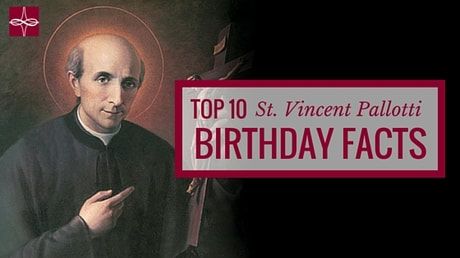
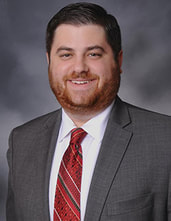


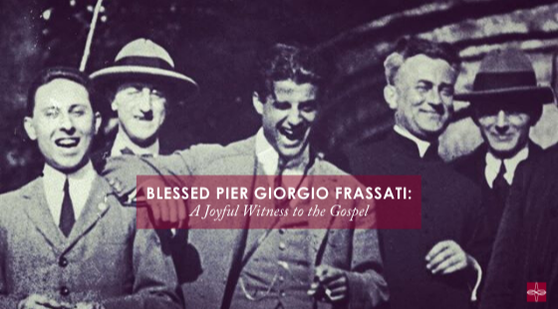

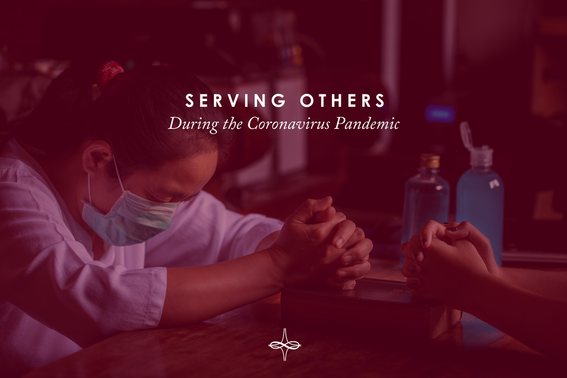

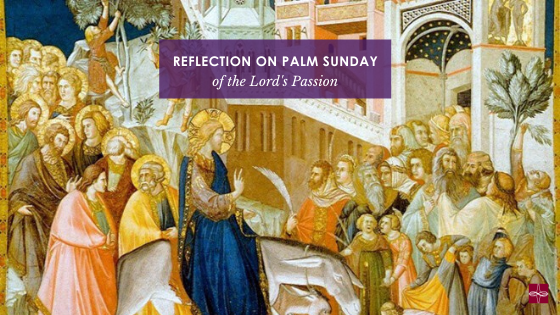


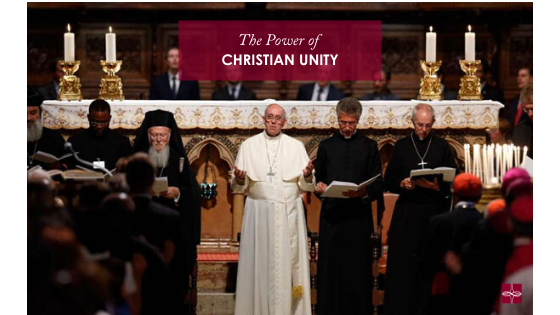

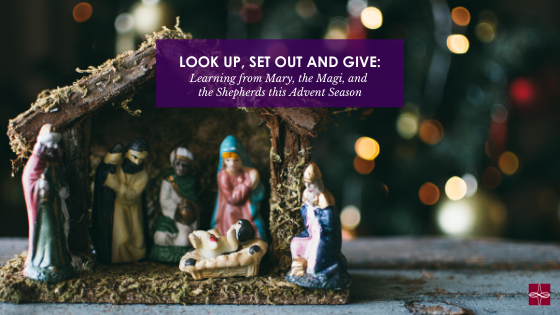

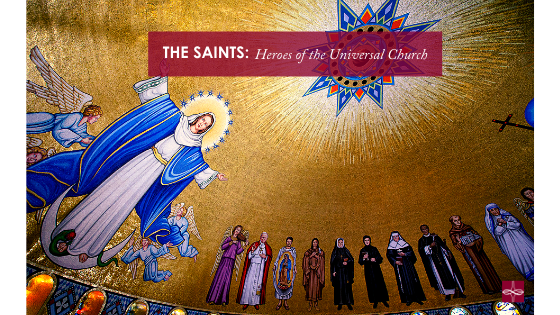

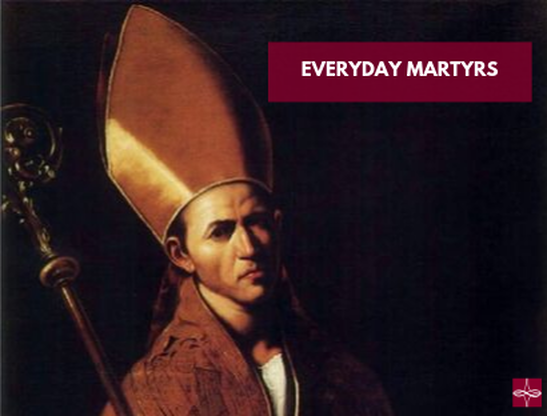





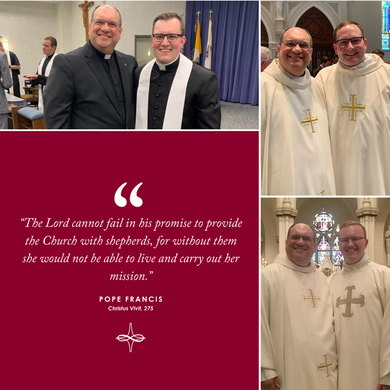
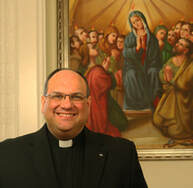
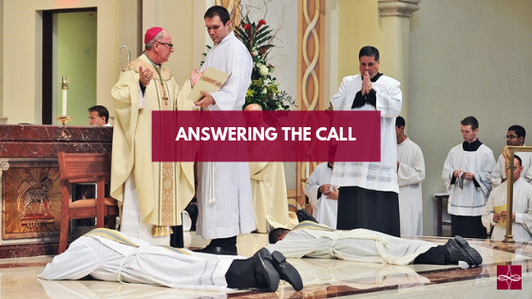

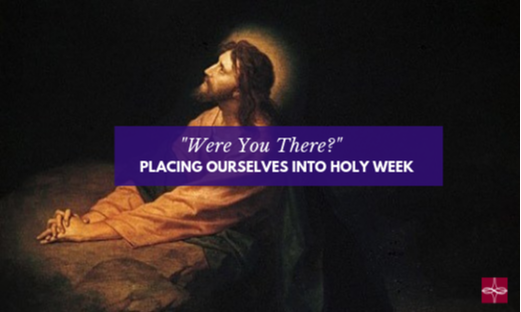

 RSS Feed
RSS Feed